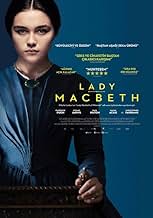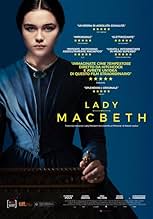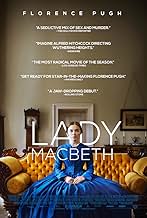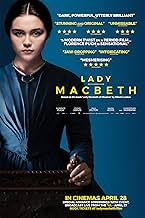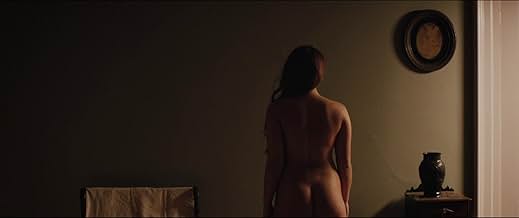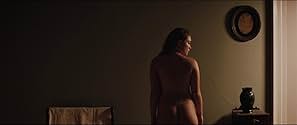IMDb RATING
6.8/10
29K
YOUR RATING
In 19th-century rural England, a young bride who has been sold into marriage discovers an unstoppable desire within herself as she enters into an affair with a worker on her estate.In 19th-century rural England, a young bride who has been sold into marriage discovers an unstoppable desire within herself as she enters into an affair with a worker on her estate.In 19th-century rural England, a young bride who has been sold into marriage discovers an unstoppable desire within herself as she enters into an affair with a worker on her estate.
- Nominated for 2 BAFTA Awards
- 24 wins & 58 nominations total
Kema Sikazwe
- Farmhand
- (as Kema Slkazwe)
- Director
- Writers
- All cast & crew
- Production, box office & more at IMDbPro
Featured reviews
"Lady Macbeth" is like a Charlotte Bronte novel if the main heroine were a psychopath.
Florence Pugh plays a young woman saddled with a marriage and an estate that she did not choose for herself, who gets a taste of what it is to give in to her own passionate urges when she shacks up with a hunky stable boy and then decides that she will have a life with him no matter what or who she has to eliminate to make it happen.
"Lady Macbeth" sounds dark and juicy on paper, and it could have been a fabulously lurid spin on the Victorian Gothic template, but as treated here it's far too restrained to take advantage of the pulpy subject matter. The whole film, from the direction to the performances, really needed to go for it and not hold back. Instead, it's too quiet and slow by half, and though Pugh does an admirable job, one can't help but wonder how much more memorable a character she might have been able to create had she been allowed to really go off the rails. Maybe an odd and random thought, but the whole time I was watching this movie I was thinking what a younger Naomi Watts could have done with it.
Not a total misfire, but nowhere nearly as good as it could have been.
Grade: B
Florence Pugh plays a young woman saddled with a marriage and an estate that she did not choose for herself, who gets a taste of what it is to give in to her own passionate urges when she shacks up with a hunky stable boy and then decides that she will have a life with him no matter what or who she has to eliminate to make it happen.
"Lady Macbeth" sounds dark and juicy on paper, and it could have been a fabulously lurid spin on the Victorian Gothic template, but as treated here it's far too restrained to take advantage of the pulpy subject matter. The whole film, from the direction to the performances, really needed to go for it and not hold back. Instead, it's too quiet and slow by half, and though Pugh does an admirable job, one can't help but wonder how much more memorable a character she might have been able to create had she been allowed to really go off the rails. Maybe an odd and random thought, but the whole time I was watching this movie I was thinking what a younger Naomi Watts could have done with it.
Not a total misfire, but nowhere nearly as good as it could have been.
Grade: B
Looking at the title, you might think director William Oldroyd's Lady Macbeth is about revenge, lust, murder, and boredom, and you would be right on all counts. Katherine (Florence Pugh), a 19th century teen bride of an arranged marriage to a middle-aged drunk, can't get no satisfaction. Her husband is impotent for starters, and the estate is so forbidding murder would seem to be a required pastime.
Yet, sex is the prime mover here, where she discovers randy groomsman Sebastian (Cosmo Jarvis), and takes him to bed in the long absence of her hubby. Meek black Anna (Naomi Ackie), Katherine's servant, observes the shenanigans, much as we do, unable to change what she sees will be an outcome unpleasant to the core. To the end Anna is faithful to Katherine, a slave to a mistress who is herself a slave to men and convention.
Several archetypal themes arise in this somber, artfully-photographed drama. For instance, one that emphasizes the wages of sin is prominent; another about the subjugated rising against the oppressor; and another about the danger of socially imprisoning smart women in a paternalistic society. A leitmotif also surfaces about the dangers of debilitating class distinctions, which are never a good thing in the long haul.
Ari Wegner's cinematography is portrait-like if considering only the recurring shot of Katherine sitting on her Victorian couch in a consuming dress that seems to deteriorate with each similar shot. Underneath the dress is the corset, so long a symbol of the era's tight hold on women.
Remembering Amma Asante's Belle, I'm pleased to see another art- film treatment of fraught race relations in merry ol' England. That none of this will ever stop is promised in the spawn of the miscreants, children of evil destined to repeat their parents' sins.
Lady Macbeth is an interesting minimalist story of a smothered young woman, whose intensity will lay waste to the social fabric of the estate. In fact, much of the proceedings are Shakespearean with their emphasis on man's weakness in his dominance, a woman's Eve-like ability to lure men into sin, and the pride that inevitably leads to a fall.
Depressing but dramatically satisfying.
Yet, sex is the prime mover here, where she discovers randy groomsman Sebastian (Cosmo Jarvis), and takes him to bed in the long absence of her hubby. Meek black Anna (Naomi Ackie), Katherine's servant, observes the shenanigans, much as we do, unable to change what she sees will be an outcome unpleasant to the core. To the end Anna is faithful to Katherine, a slave to a mistress who is herself a slave to men and convention.
Several archetypal themes arise in this somber, artfully-photographed drama. For instance, one that emphasizes the wages of sin is prominent; another about the subjugated rising against the oppressor; and another about the danger of socially imprisoning smart women in a paternalistic society. A leitmotif also surfaces about the dangers of debilitating class distinctions, which are never a good thing in the long haul.
Ari Wegner's cinematography is portrait-like if considering only the recurring shot of Katherine sitting on her Victorian couch in a consuming dress that seems to deteriorate with each similar shot. Underneath the dress is the corset, so long a symbol of the era's tight hold on women.
Remembering Amma Asante's Belle, I'm pleased to see another art- film treatment of fraught race relations in merry ol' England. That none of this will ever stop is promised in the spawn of the miscreants, children of evil destined to repeat their parents' sins.
Lady Macbeth is an interesting minimalist story of a smothered young woman, whose intensity will lay waste to the social fabric of the estate. In fact, much of the proceedings are Shakespearean with their emphasis on man's weakness in his dominance, a woman's Eve-like ability to lure men into sin, and the pride that inevitably leads to a fall.
Depressing but dramatically satisfying.
If I were the producer of this film, I'd have chosen a different title. I'm sure lots of moviegoers are going to be misled: this film has nothing to do with Shakespeare. It's an adaptation of a novel by the Russian author Nikolai Leskov, set in early 19th century England.
The film seems to be a pre-feminism manifesto for women's rights. It shows Katherine Lester, the submissive wife of a wealthy but abusive landowner, living in a secluded manor in the British countryside. During a prolonged absence of her husband, she rediscovers her freedom and starts an affair with one of the stable boys. Not willing to give up her newly acquired status, she starts a series of increasingly extreme actions.
The interesting thing is how Katherine evolves from victim to culprit. She seems to have learned from her husband how to use and misuse power. The lack of social conscience of which she at first is a victim, becomes a driving force for her own behaviour. Her selfishness and lack of morality is so extreme that, in the end, she betrays innocent servants. The viewer has to shift his allegiances: at first, it's impossible not to sympathize with Katherine, enjoying a free life without her heartless husband. But halfway through the film, it becomes clear that Katherine is just as heartless, as soon as she is in power.
The story is filmed in a very effective, sober style with beautiful cinematography. The lack of any music is remarkable: some elongated scenes are striking because of the silence. The oppressive atmosphere in the manor is emphasized by the camera work. The camera repeatedly shows scenes from exactly the same viewpoint. Four or five times, we see the servant Anna entering Katherine's bedroom in exactly the same way.
As much as 'Lady Macbeth' is about gender, it is also about class. It is striking that Katherine, who as a woman is considered a lower form of human life by men, herself considers the servants to be a lower form of human life. She shamelessly uses them for her own purposes and enjoyment, but doesn't care at all about their fate afterwards.
'Lady Macbeth' is a beautiful film, about issues that even nowadays are worth thinking about. But I would have named it 'Lust and loneliness' - after all, it's set in the same period as the Jane Austen novels.
The film seems to be a pre-feminism manifesto for women's rights. It shows Katherine Lester, the submissive wife of a wealthy but abusive landowner, living in a secluded manor in the British countryside. During a prolonged absence of her husband, she rediscovers her freedom and starts an affair with one of the stable boys. Not willing to give up her newly acquired status, she starts a series of increasingly extreme actions.
The interesting thing is how Katherine evolves from victim to culprit. She seems to have learned from her husband how to use and misuse power. The lack of social conscience of which she at first is a victim, becomes a driving force for her own behaviour. Her selfishness and lack of morality is so extreme that, in the end, she betrays innocent servants. The viewer has to shift his allegiances: at first, it's impossible not to sympathize with Katherine, enjoying a free life without her heartless husband. But halfway through the film, it becomes clear that Katherine is just as heartless, as soon as she is in power.
The story is filmed in a very effective, sober style with beautiful cinematography. The lack of any music is remarkable: some elongated scenes are striking because of the silence. The oppressive atmosphere in the manor is emphasized by the camera work. The camera repeatedly shows scenes from exactly the same viewpoint. Four or five times, we see the servant Anna entering Katherine's bedroom in exactly the same way.
As much as 'Lady Macbeth' is about gender, it is also about class. It is striking that Katherine, who as a woman is considered a lower form of human life by men, herself considers the servants to be a lower form of human life. She shamelessly uses them for her own purposes and enjoyment, but doesn't care at all about their fate afterwards.
'Lady Macbeth' is a beautiful film, about issues that even nowadays are worth thinking about. But I would have named it 'Lust and loneliness' - after all, it's set in the same period as the Jane Austen novels.
I was enthralled by this movie from start to finish. The cinematography and sound were excellent. The complete absence of a music soundtrack except for two notable atmospheric crescendos added to the overall oppressiveness of the story and the location. All of the performances were excellent and the lead was outstanding IMO. The story was in many ways familiar - being evocative of Bronte and Hardy - with its portrayal of Victorian country gentry and the brutality and sense of entitlement that sometimes occurred between the classes but the way the story unfolded frequently surprised me by not following through in the way one might have expected it to. I too would recommend a cinema viewing in order to get the full effect of the landscape and the oppressive silence of the house.
This film tells the story of a young woman who is sold into a loveless marriage with an older wealthy gentleman. She has a passionate affair with a servant of the house. The promise of a happier life eludes her, until she takes full control of the situation.
Initially I thought the film was really about Macbeth's wife, but I soon learn that it is not the case. The title comes from the similar ruthlessness and cold bloodedness that the leading woman and Lady Macbeth have. It is engaging to see how Katherine transforms from a timid woman into a sociopathic woman who will stop at nothing to get what she wants. The pacing is a little slow, with artistic shots lasting 10 or even 20 seconds but does not really help story telling. Overall, the story is good and Katherine's character is very interesting.
Initially I thought the film was really about Macbeth's wife, but I soon learn that it is not the case. The title comes from the similar ruthlessness and cold bloodedness that the leading woman and Lady Macbeth have. It is engaging to see how Katherine transforms from a timid woman into a sociopathic woman who will stop at nothing to get what she wants. The pacing is a little slow, with artistic shots lasting 10 or even 20 seconds but does not really help story telling. Overall, the story is good and Katherine's character is very interesting.
Did you know
- TriviaFlorence Pugh said she loved her nude scenes in this film. Pugh reflected on her breakout role during an interview for Britain's ES Magazine and admitted the part "changed everything" for her. "I loved the fact she was naked all the time. At that point in my life, I had been made to feel shit about what I looked like and that film was perfect. There was no room for me to feel insecure."
- GoofsA Cornish Rex cat first appears at 14:30. The breed first appeared around 1950.
- ConnectionsFeatured in The EE British Academy Film Awards (2018)
- SoundtracksPraise to the Lord, the Almighty
(uncredited)
German folk tune
Lyrics by Joachim Neander, translated by Catherine Winkworth
- How long is Lady Macbeth?Powered by Alexa
Details
- Release date
- Countries of origin
- Official sites
- Language
- Also known as
- Lady Macbeth
- Filming locations
- Lambton Castle, Chester-le-Street, County Durham, England, UK(The Lesters' home)
- Production companies
- See more company credits at IMDbPro
Box office
- Budget
- £500,000 (estimated)
- Gross US & Canada
- $1,129,408
- Opening weekend US & Canada
- $64,537
- Jul 16, 2017
- Gross worldwide
- $5,343,632
- Runtime
- 1h 29m(89 min)
- Color
- Aspect ratio
- 2.39 : 1
Contribute to this page
Suggest an edit or add missing content






